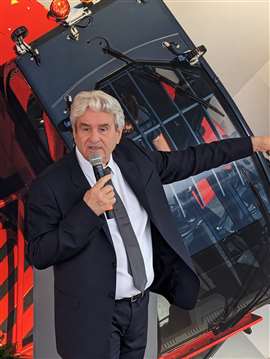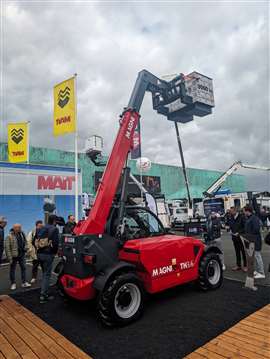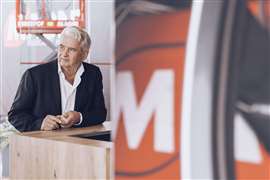Riccardo Magni on company goals and product plans
16 May 2024
 Riccardo Magni speaking at Intermat.
Riccardo Magni speaking at Intermat.
Riccardo Magni has shared his vision for the future of the company he founded in 2013.
He was speaking at the launch of Magni’s new compact telehandler during the Intermat show in Paris this April, and expanded on plans for North America, potentially producing its own boom lifts, and a move into the agricultural industry.
Compact launch
On the manufacturer’s stand was its first compact fixed boom telehandler, with a 3 tonne capacity and 5.8m working height. The new TH 3.6 becomes the smallest model in the TH range, and is designed for construction, logistics and will soon be launched into the agricultural sector.
Capable of carrying a full load to a height of 5.4m, the TH 3.6 can lift 2,500kg at its maximum height and 1,100kg at more than 3m horizontal reach. The machine’s ‘low-slung’ design makes it ideal for tight spaces, while maintaining optimal ground clearance for rough terrain, said Magni.
Magni also used the show to highlight an updated raised cab, which has now been reintroduced to the RTH rotating range, specifically on the RTH 6.22, 6.26 and 6.31 models, following requests from dealers for an effective raised cab system.
Product plans
Magni said the company planned to launch into the agricultural sector this year with seven models. Last year Magni bought back the 20% stake Dingli owned in it. During that part ownership Magni designed the unique look of Dingli’s small to mid-sized booms with lowered chassis and components and continues to represents those products.
While Magni said it cost four times more to buy back the part share than Dingli had bought it for in the first place it had been a reasonable outcome.
“It was a long and difficult deal, but finally it was fair.” added Magni, “and we still have the partnership to sell their products in Europe.”
Expanding on potential challenges in Europe, Magni said the sales arrangement with Dingli could be significantly affected by tarrifs, if they are imposed on MEWPs produced by Chinese manufacturers following the European Comission’s dumping investigation, which is expected to be completed next month. “Sales in next months could be strongly impacted by antidumping as it could be that the overall volume distributed by us in Europe could be reduced.”
 Magni TH 3.6
Magni TH 3.6
Returning to the subject of telehandlers, Magni estimates that there are around 75,000 working units in the global market at present, with that number easily rising to 90,000 in the coming years, possibly even 100,000 thanks to growing markets.
“No one is using telehandlers in China but if they do start, it will be huge. And if India moves to telehandlers it will be even bigger as a market.”
Taking on the competition
On the subject of potential competition from Chinese manufacturers, Magni believes an influx of products into Europe from the country is much less likely than the phenomenon that we have seen with MEWPs. “It is not so easy to produce a telehandler – its not like a loader crane, as there can be more than 100 attachments.”
Magni also pointed out that several construction equipment manufacturers based in Europe had attempted to enter the rotating telehandler market without success and added that with lower production volumes the product type was a less attractive proposition for those based in China.
One area offering huge potential is the US, Magni went on to say. The company has two facilities in the country and 52 employees and plans to expand its offering of European-type telehandlers in the US. “We offer that high level of safety and North America is picking up on that.”
In a recent order, United Rentals took 500 units from Magni, including 10,000 and 12,000 pound models.
Magni is also pushing the concept of large rotating units replacing cranes in the 45 tonne capacity range. Magni said such units are also capable of talking the place of ultra boom lifts thanks to their ability to lift people to 58m with a 400kg capacity.
While an equivalent crane costs around $420,000 to buy, compared to $300,000 for a mega boom, it is capable of carrying out the same applications as both.
“We killed the 35-tonne crane in Europe,” says Magni, “Now we want to go after the after the bigger cranes.”
MAGAZINE
NEWSLETTER
CONNECT WITH THE TEAM







